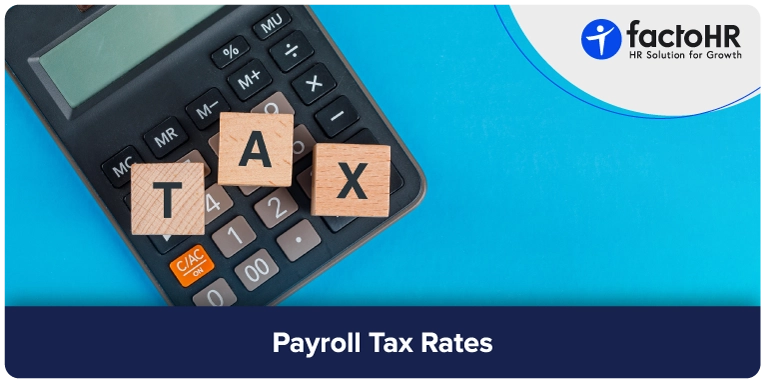Payroll Taxes: Definition, Meaning, and Types

Table of Contents
Payroll taxes are generally seen as levied on the pay or salary paid by an employer to his workers. Payroll taxes in India are among the highest percentages of any organization’s total tax liabilities. The employee’s paycheck usually has some part deducted, with the rest going to the employer and the government. This blog will provide you with information about payroll taxes in India, which includes the types, rates, and significance, among other things, so that you can smoothly move through this critical area regarding your company.
What are Payroll Taxes?
Payroll taxes are one kind of a tax which is charged by the government on employers and employees to support different social security programs such as Social Security, Medicare, and unemployment insurance. These usually get deducted from an employee’s salary slip for an employee together with the employer’s contribution. The cash generated from taxes is used to provide benefits like disability insurance, old age pensions, and health care.The payroll tax can also serve as a funding avenue for certain kinds of expenditures like unemployment compensations or workers’ compensation schemes.

Types of Payroll Taxes
There are various payroll taxes, namely income tax, professional Tax, and contributions to employee welfare funds, such as the Employee Provident Fund (EPF) and Employee State Insurance (ESI).
Income Tax
It is a personal levy that the government imposes upon every worker’s salary from all sources like accrued salaries, bounties, and dearness allowances, among others. Rates for income tax propound fluctuating patterns start at 5% and end at 42.7%. The Tax collected directly by the state from their citizens on the wages they receive is an instance of income taxation, as brought out by the various forms it takes; for example, there are salaries, profits, rents, and capital gains, among others, that contribute to one’s earnings. Income tax is computed based on net earnings after deducting all allowable expenses, such as insurance premiums or retirement contributions.
Professional Tax
Professional Tax is a kind of local Tax that is imposed by the state government on individuals who are professionals and employees, earning specific amounts of money or working in particular categories of jobs. The tax rates differ from one state to another; some states have fixed prices that range between INR 200 – 500 every year.
EPF Contribution
This is a kind of Tax in which every Employee is expected to contribute to their retirement fund. While workers contribute 12% of their basic pay, employers also make a 12% contribution plus an extra 3.67% to the Employees’ Pension Scheme.
ESI Contribution
This is a kind of Tax which is made obligatory for the staff in order to finance health care and other perks connected therewith. For the purpose of this Tax, workers are expected to remit 1.75% from their gross pay and employers shall give 3.25%.
Importance of Payroll Taxes
Conformity
Failing to keep up with the rules on Tax in relation to salaries brings about great financial destruction in your business as it results in defaults and penalties.
Employee Benefits
Different types of worker benefits like pension plans, health coverage or any other social benefits arise from payroll deductions.
Operating Expenses
Since they are part of an organization’s running costs, payroll taxes can be deducted from taxable income.

Common Challenges in Payroll Tax Management
Though it’s important, many companies find it challenging to handle taxes. Among the usual difficulties are:
Challenging Compliance
A long and complex process involves staying up to date with the constantly modified legislation regarding taxation.
Accurate Calculation
Unless you’re an expert in the field, calculating payroll correctly can be incredibly tricky due to various kinds of levies and allowances.
Employee Information Administration
Tracking employees’ wages and commissions together with perks is genuinely heart-wrenching.
Employee Education
For big companies comprising a mixed group of employees, it could be hard educating them on payroll taxes and their contribution to those taxes.
Software Integration
For organizations with many systems integrated into one, it becomes very challenging to link their payroll software to existing HR systems.
Payroll Tax Rates in India (2024)
Income Tax
The payroll tax deducted by any organization is commonly varied depending on the income or the salary of an individual taxpayer.
It ranges as the following,
- 10% on salaries ranging from Rs. 2.5lakhs to Rs. 5 lakhs.
- An average of 15% of earnings are deducted from a salary pack ranging from Rs. 5 lakh(500000) to Rs. 7.5 lakhs(750000)
- 15% for income between ₹5 lakh and ₹7.5 lakh,
- 20% for income between ₹7.5 lakh and ₹10 lakh,
- 25% for income between ₹10 lakh and ₹12.5 lakh
- 30% for any income above 12.5 lakhs.
Professional Tax
Professionals and workers whose earnings reach a certain level or who are engaged in a particular kind of work are subject to this type of state-level Tax, known as Professional Tax. Different states apply different tax rates, some charging as low as Rs. 200 while others may demand up to Rs. 500 yearly. For instance, in Maharashtra, professional taxable income is limited to Rs. 350 annually, whereas in Tamil Nadu, it stands at Rs. 250 every year. In most cases, you will find that when deductions are made by an employer so that they can remit all taxes, including the employee’s income taxes, then professional ones will also be included.
EPF Contribution
As far as this Tax is concerned, every worker and their employer must contribute some money, which will be subtracted from their overall income based on what they earn for pension purposes. For instance, an individual’s share comes to 12% of his/her basic salary together with what the employer has been contributing, which stands at another 12% more (with another additional 3.67% meant for the Employee’s Pension Scheme). Salary of this kind under EPF does not exceed ₹17,500 monthly.
ESI Contribution
The monetary payment from employees and employers for health care and additional social security benefits constitutes the Employee State Insurance (ESI). For employees, the amount payable as a monthly deduction is 1.75% of the basic salary, while that of employers is 3.25%. On the other hand, ₹50 per day is the upper limit set on contributions made towards ESI. The Employee State Insurance (ESI) contribution, which is a must-have deduction for both employers and employees, covers medical and other social security benefits, for that matter.
Other Deductions
Not only do employees pay taxes, but they might also have deductions based on their health coverage, collective life insurance and various other compensations. The basic idea here is that deductions differ based on what policies the employer has put in place.
Tax Exemptions
There are several tax exemptions which are given under various sections of the Income-tax Act like Section 80C or Section 80D etc. One may avail certain exemptions such as EPF contributions, life insurance premiums, health insurance premiums, contributions to National Pension Scheme (NPS) and Public Provident Fund (PPF).

Calculation of Payroll Taxes
This is an example of payroll computation using these specific percentages.
Gross Pay: 60000 Rupees
Monthly Allowances: 15,000 rupees in housing rent allowance(HRA) and 8,000 in medical reimbursement.
Income Tax
Taxable Income Calculation: 37000 Rupees (60000 minus 23000) Income tax rate: 20 percent (on taxable income)
Professional Tax
Professional Tax Rate by State: ₹350 per year.
Amount of Professional Tax: ₹350
EPF Contribution
Both Employee’s and employer’s share of contribution is equivalent to 12 percent of basic pay, amounting to ₹9,600/-
ESI Contribution
The percentage share of employees about their basic pay is 1.75% (₹1050). The percentage corresponding to an employer is 3.25% of their basic salary (₹2,050).
Total Deductions
Income tax: ₹7,400
Professional Tax: ₹350
EPF contribution:₹9,200
ESI contribution: ₹3,100
Net Pay
Gross pay: ₹60,000
Total deductions: ₹19,950
Net pay: ₹40,050
Conclusion
In summary, payroll taxes are recognized as being very crucial for any business operation in India. It is possible to successfully negotiate this complicated process by studying the various kinds of payroll taxes, tax rates, and their relevance. By adhering to set rules on different stages of processing salaries, you will ensure that your enterprise remains competitive and complies with Indian law where applicable.
Payroll taxes can be complicated and might take a lot of time if not well managed; however, it can be done with proper planning and execution. HR practitioners must clearly communicate tax withholding requirements as well as payment timelines and benefits to employees to avoid misunderstandings or disagreements. By being proactive and knowledgeable, human resource personnel can contribute towards lowering payroll taxation woes in their organizations without any inconveniences. The HR professionals can manage all their payroll taxes through factoHR’s payroll software. It enhances their functions effectively.

Frequently Asked Questions
1. Are professional taxes exempt for employees?
You may contact HR regarding the exemption process. Exemptions for professional taxes may apply in certain instances particularly if employees are in specified sectors, earn salaries ranging from 15,000 to 20,000 per annum or have been exempted based on varying states’ laws. This makes it necessary for employees seeking to be exempted from paying professional taxes to discuss their eligibility with the HR department.
2. How do workers calculate ESI payment?
The HR department can provide a guide on ESI contribution calculations. The company usually contributes 3.25% of basic salary whereas an employee contributes 1.75% of the same amount. It should be noted that these calculations only apply to basic salaries and not on any additional allowances or benefits.
3. Can employees claim certain allowances as income tax exempt?
The HR department can help with details about tax exempt allowances. Some allowances are not subjected to income tax such as House Rent Allowance (HRA), Medical Allowance, Travelling Allowance Uniform Allowance among others including Student Allowance by the company which they work for. Consequently, it is advisable that employees go through the firm’s regulations while meeting with someone from the one responsible for human capitals in order to find out more about these things.
Grow your business with factoHR today
Focus on the significant decision-making tasks, transfer all your common repetitive HR tasks to factoHR and see the things falling into their place.

© 2026 Copyright factoHR


